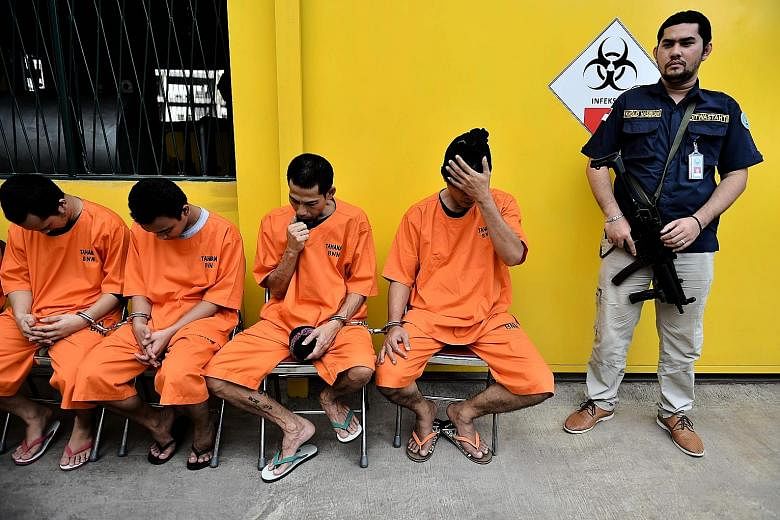BANGKOK/YANGON • The Philippines has launched a bloody "war on drugs" that has killed at least 2,400 people in just two months, while neighbouring Indonesia has declared a "narcotics emergency" and resumed executing drug convicts after a long hiatus.
In Thailand and Myanmar, petty drug users are being sentenced to long jail terms in prisons already bursting at the seams.
The soaring popularity of methamphetamine - a cheap and highly addictive drug also known as meth - is driving countries across Asia to adopt hardline anti-narcotics policies. The amount of meth seized in East and South-east Asia almost quadrupled from about 11 tonnes in 2009 to 42 tonnes in 2013, said the United Nations Office on Drugs and Crime (UNODC).
The only region seizing more meth was North America, where the booming trade inspired the popular television series Breaking Bad.
Meth was the "primary drug of concern" in nine Asian countries, the UNODC said, including Indonesia, the Philippines, Thailand, Japan and South Korea. A rising chorus of experts blame this surge in production and use of meth in Asia on ineffective and even counterproductive government responses.
They say national drug-control policies are skewed towards harsh measures that criminalise users but fail to staunch the deluge of drugs or catch the kingpins behind it. They also want a greater emphasis on reducing demand through more and better quality drug rehabilitation.
Meth is a transnational business, worth around US$15 billion (S$20 billion) in mainland South-east Asia alone in 2013, the UNODC says.
Much of the production takes place in laboratories in western Myanmar. Ingredients are smuggled across porous borders from India, China and Vietnam. Laos and Thailand are major trafficking routes, with the finished product travelling by road or along the Mekong River for distribution throughout South-east Asia and China.
Meth is sold as cheap pills called "yaba", a Thai name meaning "crazy medicine", or in a more potent, crystalline form known as "crystal meth", "ice" or "shabu".
The meth explosion carries huge social consequences: overburdened health services, overcrowded prisons, families and communities torn apart. Small-time users and dealers bear the brunt of unsparing law enforcement that is popular in crime-weary communities.
In mid-July, as drug war killings escalated in the Philippines, one survey put President Duterte's approval rating at 91 per cent. Thailand launched an equally popular "war on drugs" in 2003 that killed about 2,800 people in three months. But figures show it had no lasting impact on meth supply or demand in Thailand.
Meth addiction is tough to treat, ideally requiring costly and time-consuming counselling. Long-term use can cause changes in brain structure and function.
In March, US President Barack Obama said drug dependency should be seen as "a public health problem and not a criminal problem", part of a bid to roll back a "war on drugs" begun in the 1970s and now widely seen as a failure.
Policy in Asia is largely moving in the opposite direction, with drug rehabilitation underfunded and inadequate. Less than 1 per cent of dependent drug users in Indonesia got treatment in 2014, said the UNODC.
"Rehab" in many countries often means detention at a state facility. In Thailand, thousands of users are held at army camps for four months. Relapse rates at drug detention centres range from 60 to 90 per cent, says the World Health Organisation.
"Often, the government response causes more harm to an individual than the drug itself," said Ms Gloria Lai of the International Drug Policy Consortium (IDPC), a global network of 154 non-governmental groups.
REUTERS

